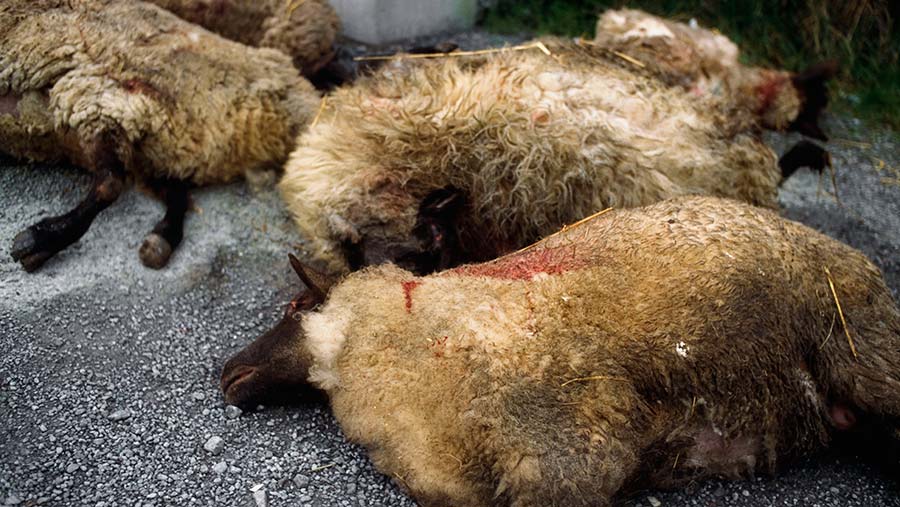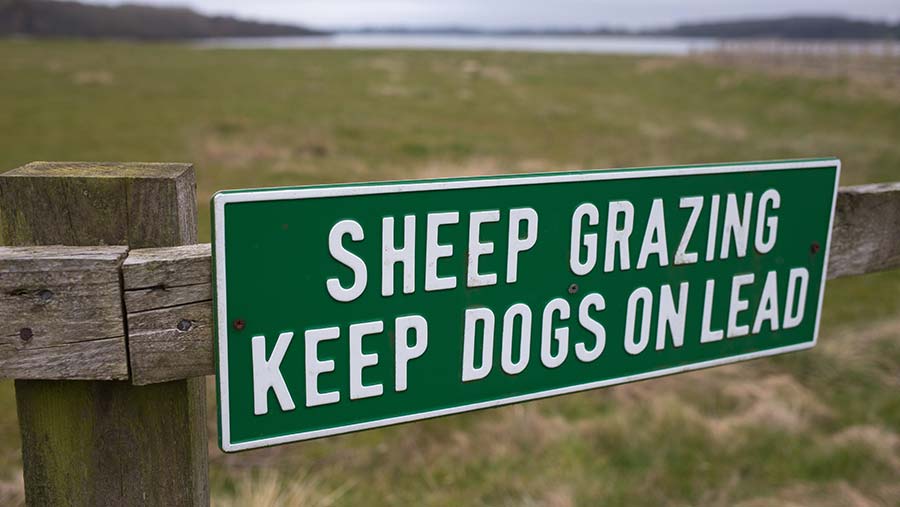Dog attacks on livestock cost farmers £1.2m last year
 © Design Pics Inc/Shutterstock
© Design Pics Inc/Shutterstock Livestock worth more than £1m was savaged by dogs last year, according to the latest figures from NFU Mutual.
The rural insurer said farms in England were the worst hit and they experienced a 15% rise in the cost of attacks, based on claims reported.
The sharpest cost rises in 2019 were in the South East, up 87%, and the North West of England, up 79%.
See also: What to do if you’re a victim of… sheep worrying
But there were welcome reductions in the figures in Scotland, Wales and Northern Ireland, where co-ordinated campaigns have helped change attitudes among dog owners.
Scotland, Wales and Northern Ireland saw falls of 30% (£113,789), 15% (£242,768) and 61% (£14,514), respectively.
As lambing season approaches, NFU Mutual is calling for dog owners to ensure their pets are under control at all times when livestock are nearby and to report out-of-control dogs to a local farmer or the police.
Keep dogs under control
With many families expected to visit the countryside during half-term holidays, NFU Mutual is launching a campaign urging dog owners to keep their pets under control at all times when livestock could be nearby.
A survey of more than 1,300 dog owners commissioned by NFU Mutual reveals that more owners now put their dog on a lead if they see a sign warning them livestock are nearby – 95% compared with 90% in 2018.
However, 63% of dog owners say they let their pets roam free in the countryside, despite half admitting their dog doesn’t always come back when called.

The NFU Mutual survey found more dog owners are responding when they see warning signs © Tim Scrivener
The research found a steady increase over the past two years in the number of dogs allowed outside unaccompanied when their owners are out (56% in 2020, rising from 52% in 2019 and 43% in 2018). Fifteen per cent of owners admitted their dog had escaped from home in the past.
“This confirms farmers’ fears that a significant number of dog owners are letting their dogs roam free unsupervised,” said Rebecca Davidson, rural affairs specialist at NFU Mutual.
“Whether they don’t know or don’t care about the carnage their pets are causing, these dog owners are giving a bad name to the responsible majority who do keep their pets under control.”
Campaigns working
In North Wales, a five-year police campaign to tackle livestock attacks by dogs has resulted in the number of reported attacks halving.
In recent years, North Wales Police has received about 120 reports of livestock worrying a year. But last year that fell to 49.
PC Dave Allen, of North Wales Police’s rural crime team, said the force was seeking a change in legislation to increase police and court powers and to offer livestock keepers more protection from dogs that attack their livestock.
NFU Mutual and NFU Scotland are two of the rural organisations taking part in a campaign, with Police Scotland’s Scottish Partnership Against Rural Crime (Sparc) initiative to highlight the reality of livestock attacks.
The aim of the campaign, “Your Dog – Your Responsibility”, is to ensure dog owners understand the distressing nature as well as the emotional and financial impacts such incidents can have, not just on farmers but on everyone having to deal with the aftermath.
NFU Scotland chief executive Scott Walker said: “Scottish farmers and crofters continue to be blighted by dog worrying. It is encouraging that these figures show a decrease, but we believe that there is still a chronic under-reporting of this problem.
“Scottish government intends to look more closely at relevant dog legislation in 2020. This is something that we will engage with strongly.”
Case study: Caroline Harriott, Arundel, West Sussex
Sheep farmer Caroline Harriott is one of a number of South Downs farmers who have had to stop keeping sheep on hundreds of acres of pasture because of repeated attacks on their flocks by out of control dogs.
The area is hugely popular with dog walkers and there have been so many incidents of worrying that they have had to take the sheep off that land.
“It’s not just sheep that are being put at risk,” Ms Harriott says. “One of the key conservation projects in the South Downs National Park is protecting the habitat of ground-nesting birds.”
Over the past decade, more than 100 sheep have been killed or injured in attacks on her farm.
One recent attack was filmed by a member of the public, and she says the image of her sheep being chased round and round the field and repeatedly pushed into fences by the dog is now “locked in my mind”.
“|t’s heart-breaking to get a phone call and rush to the field and find the aftermath of an attack – sheep killed, others so badly injured they have to be put down, sheep in absolute terror after being chased round the fields, and sheep so stressed they lose their unborn lambs,” she says.
Ms Harriott, who runs a flock of 600 ewes and rears lambs near Arundel, is concerned that the growing trend for dog owners to leave their pets in the care of professional dog walkers during the day is also leading to more attacks.
“Professional dog walkers have become a major problem,” she says. “Under the present law one person can take up to six dogs out. To my mind, there’s no way one person can keep six dogs under control in the countryside – even picking up the dog mess is practically impossible.
“We need new legislation to bring a workable balance between the dog-owning public and farming. The present, laws simply don’t address the problems we are dealing with day in, day out.”
